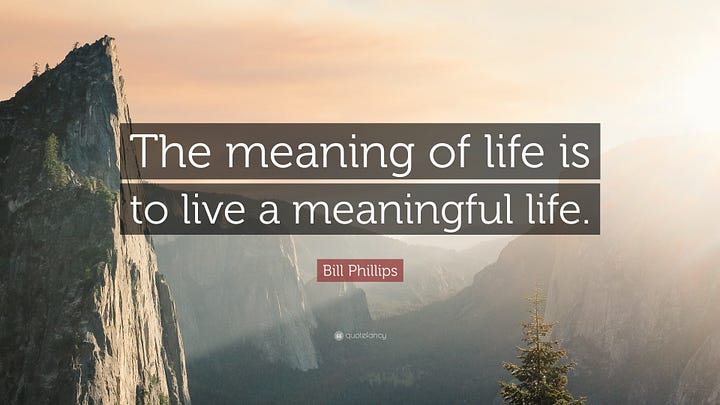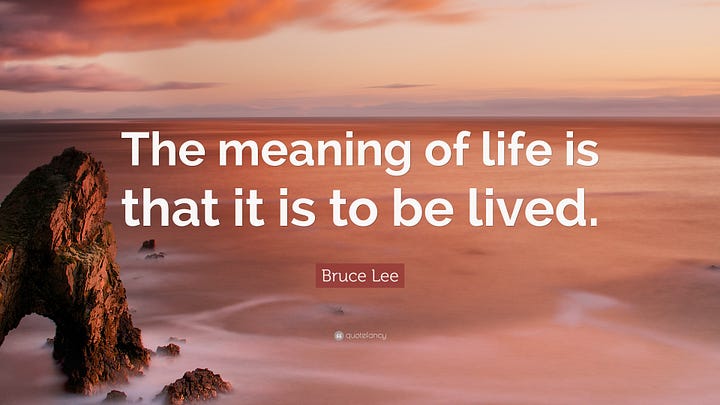I. Two Questions
If you’re a professional philosopher, people periodically ask you what the meaning of life is. I don’t know the answer. I don’t even know what kind of thing could possibly count as an answer. A thing (“the meaning of life is squirrels”)? A proposition (“the meaning of life is that dogs bark”)? An activity (“the meaning of life is to jump higher than your neighbors”)?
So I won’t answer it. You can stop reading now. (But if you know the answer, or even understand the question, please comment below.) Instead, I’ll say something about the related and possibly better question, “How might one live a meaningful life?”
Another popular question is how to attain happiness. In my classes, I regularly devote the last unit of the course to student-selected topics (selected by vote among student-offered suggestions). Last semester, the most popular topic was “happiness”. I assume they didn’t want to hear conceptual analyses of the word “happiness” (as most academic philosophers would) but instead probably wanted to hear about how to get the thing.
So I’m going to give you a summary of what I told them on one day. And the reason why I put these two questions together is that the answers to them are roughly the same — how to attain happiness is roughly the same as how to live a meaningful life.




II. Some Weak Philosophers’ Arguments
But first, I have to review some famous things said by famous philosophers about happiness.
Aristotle
Aristotle argued that the good for human beings should be (a) an end in itself (something aptly desired for its own sake, not just for the sake of something else) and (b) self-sufficient (enough by itself to make your life good). He argued that “happiness” (eudaimonia) was the good since it has these two features. However, that might be a misstatement of his view, as some say “eudaimonia” means something more like “blessedness” or “flourishing” (which would also make his view a lot more vague and less useful).
Mill
Mill argued that happiness must be desirable since it is desired by all. (He used the famous fallacious argument that since the only proof that something is visible is that it is seen, it must be that the only proof that something is desirable is that it is desired.)
But is happiness the sole intrinsic good? Well, he says, anything else that you think is intrinsically good is just a part of your happiness. So yes, happiness is the good. He also assumed that happiness is just pleasure.
The above arguments are weak, and happiness isn’t the sole intrinsic value. It is, however, a very important value.
III. Some Psychological Observations
1. Most people are generally happy.
Psychologists have a couple of ways of (allegedly) measuring this. One is to ask people about their general level of satisfaction with their lives. Another is to have people record how good they feel at random times. Maybe there are others, but those are two important ways. Either way yields the result that most people are generally happy.
2. Default happiness level.
Most people have a default happiness set point. When something good happens, you go up for a while, then return to the default level. When something bad happens, you go down, then return to the default. This default level is durable and partly genetic. You probably perceive your degree of happiness as mainly due to the goodness or badness of the external world, but it is probably actually mainly due to your temperament.
3. Money buys happiness, up to a point.
If you’re having trouble keeping the heat on, you’re likely to be unhappy. But there’s some moderate level of income after which more money has minimal effect on your happiness. I’ve heard different figures quoted for this level; most recently, I heard $75,000/year. If you have at least that much, you should relax about the money and start looking to other factors to improve your life.
4. Sources of unhappiness: excessive attachments
Many people have observed that excessive emotional attachments cause unhappiness (esp. Buddhists & Stoics). This especially includes:
Attachments to inherently fleeting things.
Attachments to things one cannot control.
Very specific expectations about other people’s thoughts/feelings/behavior. If you think that all decent people must feel X in circumstance C (and if you have a lot of thoughts like that), then you’re going to be unhappy. Most of those thoughts are also false.
Attachments to things that don’t matter. E.g., if you spill your orange juice, it’s silly to get upset, as a glass of juice doesn’t matter, and there are many more glasses available.
5. Sources of unhappiness: Irrational beliefs
One of the more effective therapy techniques is cognitive emotive behavioral therapy. This is based on the theory that many people have false & irrational beliefs that cause a lot of unhappiness and other problems. The therapy tries to get people to notice and correct these beliefs. Here are two common examples:
a) Catastrophizing: This is where you believe that failure to get something you want is a disaster. Usually, when you fail to get what you want, there in fact aren’t any big negative consequences. E.g., what if you do something embarrassing in front of your peers? Then what would happen after that? Usually, nothing.
b) The belief that the past controls the present. E.g., because something bad happened to you in the past, you’re unable to succeed now, to be happy, etc. What is mistaken about this? As one CEBT advocate once put it, “How can the past control the present? The past doesn’t exist anymore.”
Of course, past events can leave behind traces that still exist. But I think the point is that the past influences the present (in the cases of most interest to therapists) mainly through your beliefs and attitudes about it, which are changeable by you.
IV. The Key to Happiness, at Last
My supposition is that your general life satisfaction will be very strongly correlated with how meaningful your life is, or at least feels. I think that there are two main sources of life satisfaction/meaning for human beings:
a) Personal relationships. Try to cultivate deep personal relationships with some people in your life, such as your family, friends, and spouse. Marrying a suitable partner and maintaining a strong relationship with that person is probably the most important thing. Btw, merely having a boy/girlfriend isn’t the same; actually getting married makes the relationship better. Most people will also get a lot of satisfaction and a sense of meaning from having children. These things are more important than the things you give up (money, free time, fancy vacations).
b) Meaningful work. Try to have a career in which (i) you’re reasonably good at what you do, (ii) you are making use of your talents, and (iii) you view the job as worthwhile, i.e., what you are doing every day is something good. (Example: Don’t work in advertising, unless you believe dishonesty is good. Which you shouldn’t believe.)
These are pretty intuitive pieces of advice, perhaps obvious. I bet few people thought you should try to have bad relationships, after all. But most people probably don’t prioritize these things as they should. Some might think that the key to happiness is money, fame, or power. I believe those things are low on the list of happiness sources, partly because they don’t create a sense that your life is meaningful. Humans are generally built so that (a) close relationships and (b) work that uses our talents to produce something good, feel meaningful. These are the things that are most likely going to prevent you from feeling as if your life was wasted – because they will prevent it from in fact being wasted.
If you have any more secrets of happiness, post them below.







“Don’t work in advertising, unless you believe dishonesty is good.”
If everyone takes your advice, that would cause an unfortunate effect. I suppose we can treat it as a joke. And I suppose it *is* difficult to thrive in the advertising field while being scrupulously honest. But is it impossible, or just very difficult?
If good products exist, do dishonest ads for them necessarily improve sales more than an honest (and entertaining) ones would? How much experience does a consumer need to learn to be skeptical of ad tricks? What criteria should we use (other than repeat sales) to distinguish good products from bad ones? Can dishonest ads make bad products into winners?
"He also assumed that happiness is just pleasure." Well, hold on. I think you need to give the reader a sense of the sort of thing you're trying to talk about when you say happiness. You say you're not gonna give a conceptual analysis (or the reader isn't interested in one), but maybe at least give some clear sense of which of a few different common meanings of happiness you're after?